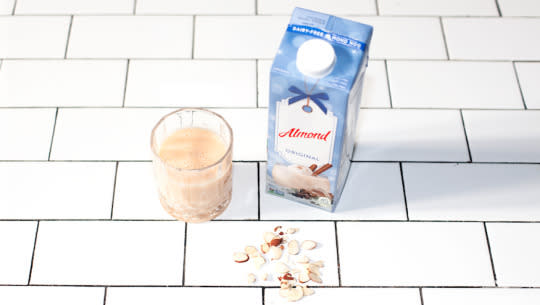Buyer Beware: Almond Milk
We recently published this beauty food recipe on how to upgrade your almond milk. The simple, delicious recipe spurred many readers to Ask Charlotte a flurry of questions about almond milk—should you really be drinking it? What brands should you buy? If you make your own, what can be done with all those leftover almonds? We tackle your questions, plus cover some things you never even thought about.

Photo by Ceci Gervaso
WHY ALMOND MILK?
There’s a lot of debate on dairy vs. nut milks. Aside from the obvious reasons including lactose intolerance or a vegan lifestyle, should you really be drinking almond milk? Just like anything in life, there are pros and cons.
A quick poll of Charlotte’s Book nutritionists will tell you that nut milks are the preferred dairy substitute for those that are vegan or with lactose allergies. And there is a reason that nearly all of the health coaches at Eleven Eleven Wellness use it in their morning routines. Almond milk is lower in calories than other milks as long as it’s unsweetened; it’s also free of cholesterol, saturated fat, and of course is naturally lactose free.
The drawback: even though almonds are a good source of protein, almond milk is not. Almond milk is also not a good source of calcium, and protein and calcium are certainly things that Charlotte needs to stay strong, healthy, and glowing.
Related: Decoding Natural Sugars
HOW MUCH ALMOND IS REALLY IN THERE, ANYWAY?
There has been heated debate online regarding the nutritional value of almond milk. Last summer, in a piece titled “Lay Off the Almond Milk, You Ignorant Hipsters,” Mother Jones’ Tom Philpott calculated that an entire 48-ounce jug of Califia Farms almond milk contains the same amount of protein as a mere handful of the nuts. His conclusion: “The almond-milk industry is selling you a jug of filtered water clouded by a handful of ground almonds.”
In June 2015, consumers filed a class-action lawsuit against Blue Diamond Growers, the makers of Almond Breeze, alleging that the company falsely markets the drink as if it is primarily made from almonds when, in fact, it is composed of only 2 percent almonds, with water, sugar, and additives making up most of the rest. Silk, produced by White Wave, is undergoing a similar class-action lawsuit, but it’s important to note that Silk doesn’t contain carrageenan; more on that next.
Related: The Ultimate Holiday Survival Guide
Does this mean almond milk is terrible for you? Well, no, but it does mean you should be reading the label of your almond milk very carefully. And you should probably consider making it yourself and/or making sure you supplement your diet with enough calcium and protein.
STORE BOUGHT VS. HOMEMADE
Charlotte’s Book expert nutritionist Dana James says, “Homemade almond milk has the added benefit of no carrageenan, a questionable preservative, often in the pre-packaged almond milk, and you can choose your preferred sweetener.”
If you don’t have time to make it yourself, the safest, best almond milks are organic, non-GMO, unflavored, unsweetened, and free of carrageenan. Beber organic almond milk fits the bill, and so does Whole Foods 365 almond milk.
As mentioned above, despite the fact that it’s included in the lawsuit, Silk is carrageenan free: they don’t offer an organic option, but it’s a readily available, unflavored, sugar- and GMO-free option.
Related: What Kind Of Milk Should I Be Drinking?
TOO MUCH OF A GOOD THING
Dana James warns, “If you’re eating almonds twice or more a day, you’re over-exposing yourself to almonds, much like we did with gluten. All over-exposure poses a risk for a food sensitivity and therefore chronic inflammation in the body.”
“Almonds [like gluten] are abrasive to the digestive tract. While no research has yet been done on almonds causing leaky gut, one could certainly infer that this could be the case. If we look at IBD and diverticulosis patients, they are advised to avoid nuts to reduce the incidence of flare ups. Ironically, these same patients are only now being advised to avoid gluten.” In other words, enjoy your almonds and your almond milk, but everything in moderation—that’s key.
THE RECIPE: HOMEMADE ALMOND MILK
½ cup of silvered almonds
1 teaspoon of maple Syrup
2 cups of filtered water
Put almonds, water and maple syrup into a blender and blend for 1 minute. Take the mesh bag and pour milk through it, into a glass bottle. Squeeze the bag and extract the left-over nut mixture (this can be used for gluten-free bread).
CAN I DO ANYTHING WITH THOSE LEFTOVER ALMONDS?
“Absolutely, you can use the almonds!” says Charlotte’s Book expert Dana James. Thinking of freezing them? “I don’t know what the consistency will be like once the frozen almond milk has been defrosted, but, nutritionally, it is perfectly fine and they still retain value.”
James recommends using the leftover almond pulp to make raw zucchini hummus and oatmeal. You can also make raw, gluten-free bread. Let the experimenting begin!
More from CHARLOTTESBOOK.COM:
How (And Why) To Include Matcha In Your Anti-Aging Regimen
6 Natural Remedies For Winter Blues
Fact, Fiction, or Genetics? Irina Shayk’s Papaya Powder Secret
